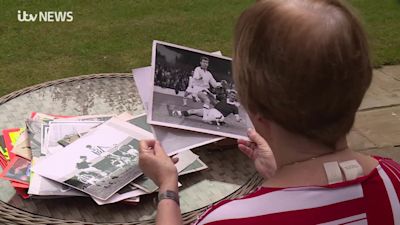Former Boro players' families welcome report findings into links between sport injuries and dementia

Report by Helen Ford
The families of footballers who developed dementia have welcomed a report calling for urgent action to cut the risks of brain injury in sport.
A committee of MPs concluded that sport had been 'allowed to mark its own homework' on the issue. Since March, the committee has been examining the link between long term brain injury and sport.
It has concluded that:
'Urgent action is needed' by Government and sporting bodies to protect players and athletes.
Recommendation that a standard definition of concussion should be adopted by all sports
A national framework for the reporting of sporting injuries should be established
It's an issue close to many in our region.
Nobby Stiles is remembered for his role in England's 1966 World Cup victory. In the early 70s, he played for Middlesbrough. Nobby Stiles died last year with dementia.
When Nobby Stiles died in October, his family chose to donate his brain to researchers.
Professor William Stewart, a neuropathologist from The University of Glasgow, studied it and presented his findings during the Department for Culture, Media & Sport select committee inquiry.
Stiles' son, John, says it was "riddled" with CTE - which stands for chronic traumatic encephalopathy. It is a progressive brain condition believed to be caused by repeated blows to the head and episodes of concussion. CTE can only be diagnosed after death.
Although John is happy with the results of the inquiry that have been released in today's report, he is still pushing for more support for families. He says the issue should be classified as an 'industrial injury' and a fund should be made available for families having to pay for healthcare as a result.
John Stiles, Nobby Stiles' son
Meanwhile, 76-year-old former Middlesbrough defender Bill Gates chose to retire at the age of just 30. His wife, Dr Judith Gates, says it was because he'd been suffering with migraines and knew he couldn't carry on playing. Gates was diagnosed with dementia in 2017.
Since then, Judith has been campaigning for more awareness of the dangers of concussion in sport and the impact in later life.
She is one of the founders of Head for Change - a charity launched in January that supports players and their families through neurodegenerative conditions. Judith's motto is "protect the players, protect the game", emphasising the aim is not to cancel sports, but make them safer so they can continue to be played.
Today, Dr Gates says she is pleased the subject is finally being recognised at prominent level, hoping the recommendations will lead to change.
Dr Judith Gates
Football heading dementia risk could be 'even greater' in female players than men
Former professional footballers more likely to die of dementia, report reveals
Ex-England rugby doctor admits 'mistakes' as he calls for more protection